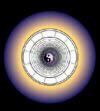|
The bait
is the means to get the fish where you want it, The snare
is the means to get the rabbit where you want it, Words are
the means to get the idea where you want it, Where shall
I find a man who forgets about words, Chuang
Tzu
|
Let's face it, baby: we perceive the world in metaphors. Apart from few sensory phenomena we experience directly, like strong pain and orgasm, it's all packed in language. See the beginning of this paragraph: we "face" something, turn our face towards it, use a visual metaphor to express an intellectual activity. To say nothing about the use of "baby" - any chance of a baby reading thins? As for the aformentioned exceptions: if you'd have to describe what an orgasm is, you'd be able to, some way or the other, I'm sure (every attempt is welcome). But the moment you feel it, well, you feel it. It may even be the same with other sensory experiences, like taste and smell, but you can and will much sooner turn them into language - and thus, into metaphor. Describe the taste of an apple. You'll use words like fresh, juicy, maybe even colours like green. No direct word for it except "apple aroma", all metaphors. And when we come to thinking, it's all metaphors again. So, the way we choose our metaphors shapes the way we perceive our world. By changing our set of metaphors, we change the world. If that isn't magic! |
| One
of the most compelling snares is the use of the term metaphor to describe
a correspondence between what the users see on the screen and how they
should think about what they are manipulating ... There are clear connotations
to the stage, theatrics, magic; all of which give much stronger hints
as to the direction to be followed. For example, the screen as 'paper
to be marked on' is a metaphor that suggests pencils, brushes, and typewriting....Should
we transfer the paper metaphor so perfectly that the screen is as hard
as paper to erase and change? Clearly not. If it is to be like magical
paper, then it is the magical part that is all important... Alan Kay, "User Interface: A Personal View" |
Language
is a process of free creation; its laws and principles are fixed, but
the manner in which the principles of generation are used is free and
infinitely varied. Even the interpretation and use of words involves
a process of free creation.
Noam Chomsky (b. 1928), U.S. linguist, political analyst. "Language and Freedom," lecture, Jan. 1970, delivered at Loyola University, Chicago |
| Man acts
as though he were the shaper and master of language, while in fact language
remains the master of man. Martin Heidegger (1889-1976), German philosopher. "Building Dwelling Thinking," lecture, 5 Aug. 1951 |
"The Tungus tribesmen of Siberia say that when the shaman goes into his trance and raves incoherent syllables, he learns the entire language of Nature." "The Language of Nature." "Yes, sir. The Sukuma people of Africa say that the language is kinaturu, the tongue of the ancestors of all magicians, who are thought to have descended from one particular tribe." "What causes it?" "If mystical explanations are ruled out, then it seems that glossolalia comes from structures buried deep within the brain, common to all people." from "Snow Crash" by Neal Stephenson |
| Syntax
and vocabulary are overwhelming constraints-the rules that run us. Language
is using us to talk-we think we're using the language, but language is
doing the thinking, we're its slavish agents. Harry Mathews (b. 1930), U.S. novelist. City Limits (London, 26 May 1988). |
The word of man
is the most durable of all material. Language is a part
of our organism and no less complicated than it. |
|
10 Most Widely Spoken
Languages: Based upon a 1998 survey. Additionally there are three other languages that are spoken by more than 100 million people each: German (128 million), Japanese (126 million), and Urdu (105 million). |
|
| Back |
